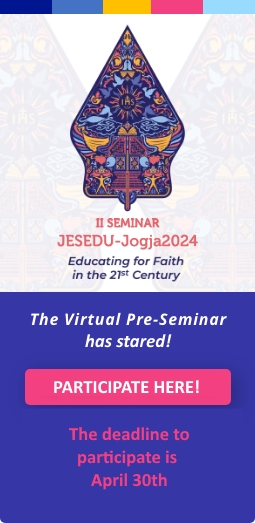I am the assistant principal for curriculum & instruction at De Smet Jesuit High School (Saint Louis, MO). I am also a member of a pilot leadership group for JSN’s Ignatian Global Engagement Mentors program (Washington, DC). It is in these two capacities that I am grateful to practice a conversation & coaching framework with colleagues and mentees borrowed from the Cognitive Coaching methodology. I use this particular methodology because it aligns closely with how colleagues within our Jesuit-supported works proceed – it’s Ignatian.
Listening & Prayerful Meditation
One premise of Cognitive Coaching’s conversation frameworks is that as coach, I am an active listener – not a suggester, not a problem solver, not a solution provider. These flexible conversation frameworks are effective roadmaps for building relationships and helping others self-reflect only if I practice listening.
As Benedet suggests, “A cognitive coach makes sure to provide a safe and non-judgmental environment where a teacher can feel safe to draw out his thoughts and emotions towards his teaching style. Coaches can use different mechanisms to draw out the internal dialogue of the teacher. The coach must be a good observer and listener.”
Sometimes, listening is difficult. Recently, as I worked with a colleague from another school during a planning conversation, my mentee came to our virtual table for our conversation somewhat distraught because of challenges at her school – related to our work but not related to this particular planning conversation. After about 5 minutes into our conversation, I quickly pivoted to simply listen to her. As she talked, I noted her frustrations, and after about 30 minutes, we ended the conversation.
At the end of our talk, she was still upset, but hopefully she felt listened to, by me. Her frustrations were difficult for me to hear and not respond to. But, I recalled something Ignatius was want to do during his time with others. “Ever since Manresa, the pilgrim had the habit when he ate with anyone . . . he listened to what was said and noted some things which he took as the occasion to speak about God. And when the meal was finished, he did so” (Inigo’s Pilgrimage to Jerusalem in 1953). So, after our conversation ended, I took a moment to look at my notes and quietly reflect and pray.
Presupposition of Positive Intent
Things are not going well, I thought. And, during my quiet post-conversation reflection and prayer after our conversation, emotions surfaced: anger and disappointment. Then, I wondered about the intent & motives of the individuals at my mentee’s school. At first, my feelings were those of desolation. However, slowly I recalled how I am invited to think and act in new and different ways about this conversation and the situation, using the Jesuit Presupposition of Positive Intent. How are my thoughts and actions counter-cultural, despite what’s happening around me and to my mentee? “In the Presupposition in the beginning of the Spiritual Exercises, St. Ignatius basically instructs retreatants to assume good intentions. Where there are two ways to interpret the words of another, one bad and one good, we should assume good intent” (The Jesuit Prayer Team). It is sometimes challenging to assume good intent, especially when colleagues are hurting as a direct result of not getting what they think they deserve. But, after meditation and some thoughtful prayer, that’s what I tried to do.
Relationship
At the heart of Cognitive Coaching conversations is the development and cultivation of relationships, eventually leading the mentee toward growth. Costa & Garmston write, “As the coach and teacher work together in a non-threatening relationship, they realize the intent of this process is to grow intellectually, to learn more about learning, and to mutually increase their capacity for self-improvement.” While we hope to achieve actionable items from productive Cognitive Coaching conversations, one intangible outcome is that meaningful and authentic conversations evolve into relationships and friendships. When we listen to others, when we hear about their hopes and dreams, when we help problem-solve – we naturally grow closer.
As I experienced direction during the Spiritual Exercises, I began to trust my director and came to understand many of the hidden dimensions of his humanity. During the time of the Exercises we were working toward building a relationship. Likewise, relationships are natural byproducts of careful listening, with positive intent, using Cognitive Coaching conversations with colleagues.
Indifference
When I remain in my role as a Cognitive Coach – that is, posing sequential and meaningful questions inviting mentees toward critical thinking and growth – I understand there is something larger at play. “The ultimate purpose of Cognitive Coaching is to modify teachers’ capacities to modify themselves” (Costa, Garmston). It’s about teachers and mentees. It’s not about me, and I cannot control outcomes. In maintaining the Jesuit habit of Ignatian Indifference, I start to understand, “A state of inner freedom, openness, and balance that allows us beforehand not to incline more toward one option than to another” (Xavier University).
There have been two recent Cognitive Coaching conversations where I have been invited to Ignatian Indifference. First, during a difficult reflecting conversation, I asked a colleague to think about her past actions toward, reflections about, and perspectives as they all relate to interactions with colleagues. I said, “You talk disparagingly about all of your professional relationships. There is a common factor: you. What is your responsibility in all of this?”
Inviting my colleague to explore her role and responsibility is difficult for her. And perhaps it was a difficult and unfair question. My colleague immediately was frustrated at the question and ended the conversation immediately. Consequently, I began to doubt my interaction and role. Soon, I started to assume responsibility for my colleague’s feelings, thoughts, and subsequent actions. Doing this, I was not Indifferent, in an Ignatian sense. It was not until a week or two later that I approached a state of openness and balance about what happened and what is happening with my colleague. While I can pose questions that challenge colleagues and mentees, I have to remember it’s not about me and I cannot control their outcomes.
Recently, I found out that a mentee I had been working with at another school would, through no decision of hers, be no longer working with me. Her role would be changing, not by her choice. She was upset. And this was disappointing, because we were building a relationship based upon our year-long conversations. Also, from my perspective, the school was growing in its programming as a direct result of our work. However, the school’s decision to change personnel invites me into a spirit of Ignatian Indifference – remembering not to incline more toward one option than to another. Hopefully, a change in personnel results in a new friendship and a renewed vision for the school’s programming. It’s not about me, and I cannot control outcomes.
One of the great blessings of my work – one of the most impactful professional development tools – has been learning about and using Cognitive Coaching. This framework for conversations not only helps colleagues grow but also provides a foundation to complement an Ignatian way of proceeding that’s essential to our work.
Works Cited
Cognitive Coaching for Principals and Teachers
Cognitive Coaching: A Strategy for Reflective Teaching
Inigo’s Pilgrimage to Jerusalem in 1953
Introduction to Inspired Decision-Making: Personal and Communal Discernment
The Presupposition of Positive Intent
The Thinking Collaborative: Cognitive Coaching

